- Home
- Neal Asher
Hilldiggers Page 2
Hilldiggers Read online
Page 2
After a few minutes, three more individuals entered the hold. These wore no armour, and the only visible weaponry they carried were sidearms – probably straightforward chemical projectile guns. They were clad in the one-piece foamite suits that were the uniform of Fleet personnel; garments that closely followed their musculature, though being over a half-inch thick they made the three of them appear quite bulky. The uniforms were cut low around the neck and down below terminated in wide deck boots. Belts and webbing straps held their sidearms, ammunition clips, an assortment of tools and the rank patches containing their security scanner barcodes. The two to the rear wore around their throats necklaces consisting of variously coloured bars, perhaps to visibly indicate their rank to their associates. The one I assumed to be the boss here, preceding these two, wore a simple platinum band around his throat. His red foamite suit stood out in vivid contrast to their dull blue ones, and he carried fewer tools. But it was the physical appearance of these three that interested me much more than their attire, for the people of Sudoria had been changed by old adaptogenic drugs and technologies to live on a planet where the temperature did not sink much below sixty degrees Celsius, and sometimes rose above a hundred degrees at the equator.
Projecting lower jaws were balanced by the bulbous rearward projection of the skulls, while their ears were just shapeless knubs as if seared by the heat of their world. Their noses ran narrow down the angular jut of their faces, with nostrils apparently normal but capable of opening as wide as an average human eye. They retained their head hair, though some cosmetic genetic tweak prevented it from growing on their faces or anywhere else on their bodies. Fleet personnel shaved the front of their skulls and plaited the rest in a queue in the manner of the ancient samurai. Their skin was a dark metallic violet that grew more reflective as the intensity of the sunlight increased. Though little different in appearance from standard, their eyes possessed nictitating membranes. Webs extended between their fingers, for cooling rather than swimming, but were probably unnecessary here in the ship, with its temperature maintained at a comfortable fifty-five degrees Celsius.
I undogged my suit helmet and placed it to one side. The one in the red suit halted by the sphere and peered inside at me, his nostrils flaring wide and the nictitating membranes momentarily dulling his eyes. I guessed I would eventually learn what such reactions meant, but the twist to his mouth and rest of his expression seemed likely to be a sneer. After a moment he stepped back and gestured for me to step out into the hold. I unfolded myself from the floor, reached over and pulled down the manual locking mechanism, and the door section, consisting of twelve hexagonal chainglass sheets inside a single ceramal frame, thumped up from its seals. I pushed it open and stepped outside.
Hot, damned hot.
I felt a slight shifting of the fibres tangled throughout my body as the two viral forms at war inside me readjusted their positions. Though not myself thermodapted, one of those conflicting viral forms enabled me to easily tolerate this temperature – just within the normal human range – and also other temperatures, both high and low, that would result in those standing before me curling up and expiring. Unfortunately, the second viral form might result in a similar end for me, too. But what would they know; they hadn’t seen a ‘normal human’ in 800 years.
‘I am told that you can speak our language,’ the boss began.
‘Fluently,’ I replied. Most people working for ECS loaded languages to their cerebral augs for instant translation, or loaded them via internal gridlinks directly to their minds. Due to certain physiological . . . differences, I couldn’t use any form of prosthetic augmentation so had to learn them the old-fashioned way. However, I am, I believe, a competent linguist. It took me a year or so to learn four of the languages spoken here (in one case, sort-of spoken), which brought the total of the languages I was conversant with up to one hundred and twenty, though I suspect I might have since forgotten one or two. ‘I presume you are the captain of this ship?’
‘I am Captain Inigis,’ he replied, ‘and knowing your facility with our language you will understand this instruction.’ He gestured at me with one webbed hand. ‘Strip.’
I shrugged, unsurprised. The dilemma faced by the Orbital Combine and the planetary parties was that those who most objected to my presence here were also the ones necessarily employed to pick me up. So I went through the laborious process of undoing all the catches and stickpads of the suit, stripped it off and kicked it to one side. I stood there for a moment in the absorbent undersuit until the captain gestured again, so I stripped that off too and stood naked before them.
Inigis now walked over to two of the scanning pillars that had earlier risen from the floor and pointed down between them. ‘Come and stand here.’ I padded over as instructed and noticed the captain quickly stepping back out of the way – touch of xenophobia there. The pillars revolved until their scanning lenses were pointing in towards me. I felt a tingling of my skin and momentary hot flushes as if a blow torch quickly skimmed over it, not held there long enough to burn, but long enough for me to be aware of it. X-ray, terahertz, magnetic resonance, point radar and much else besides. More viral shifting, but no slippage as yet. A faint ringing started in my ears and I suddenly gained the distinct impression that someone else had just entered the hold: a tall man, slightly stooped, features shadowed. I glanced over, wondering how he fitted into this scenario, then felt my stomach sink and my skin prickle. No one there – it had to be an effect of the scanning, since I was receiving the full works without any regard for my health. Someone else would have suffered radiation sickness after this and the cancer-cell hunting nanites in their bodies would have needed to work overtime. In fact I rather suspected Inigis hoped I would die from such heavy inspection. As the scan completed, he seemed rather disappointed I didn’t keel over.
Next, Inigis stood over by one of his companions, viewing an unscrolled flimsy screen. I noted how an optic cord joined this screen to the suit of the individual who handed it over, and inspected him more closely. His foamite suit was bulked with additional equipment, earphones covered his ears, a close-viewing screen covered one eye, a microphone was fixed before his mouth, and wires actually penetrated his skull. He seemed to be muttering perpetually, and moving his fingers in a continuous dance while operating the virtual control gloves he wore. Tacom, I realized. Fleet communications were run by individuals like this. Returning my attention to Inigis, I could see – even though not quite used to their facial expressions yet – he was at first puzzled, but began to show a growing satisfaction.
‘What you’re seeing,’ I volunteered, ‘are the results of a viral infection I contracted on a world called Spatterjay. Every native there has it.’ I gestured to the various rings of bluish scar tissue showing on my skin. ‘The virus is contracted through the bite of some particularly nasty critters.’
It was a half-truth, really, but I doubted they would be able to distinguish the dying virus from the one that was killing it . . . and killing me too. Even so, as I spoke, a sharp memory returned to me. I stood upon the deck of a sailing ship, and oozing along the planking by my feet was a leech as long as my arm. Blood trickled between my fingers, my hand clamped against the hole where the thing had reamed a chunk of flesh from my stomach. A sailor, dressed only in canvas trousers, his bare skin seeming tattooed with multiple blue rings, glanced at me unsympathetically and said, ‘Now you’re buggered.’
‘I’m supposed to believe this?’ Inigis asked, snapping me back to the present. ‘This seems more likely to me to be some form of organic technology. You were warned that no such Polity technologies are allowed here.’ With finality he pressed a button that ravelled the flimsy screen back into its case, and handed this back to his tacom officer.
‘It’s not a technology, just viral fibres. Your own biologists should be able to confirm this.’
‘A normal Polity human was to be sent,’ he insisted stubbornly.
‘I very much doubt Geronamid agreed
to that, since very few “normal humans” exist in the Polity nowadays. Anyway, any Earth-standard human wouldn’t be able to survive in your environment. He would have to be thermodapted like yourselves, or kept alive by Polity tech, which of course you won’t allow.’ I shrugged. ‘One such as myself seemed the politic choice, since I can survive in your environment and, being so obviously unlike you, I’m less likely to arouse suspicion.’ That was all absolute heirodont shit, of course. Geronamid chose me because I could survive in a wide range of environments – including that of the other inhabited world of this system – and because I possessed other non-technological advantages.
‘It will be necessary to confirm this under question—’
The side door opened and two more people pushed into the hold, past the guard stationed there. One was female – the first I had seen, Fleet being so patriarchal – the other a quite old man, stooped and leaning on a gnarled wooden cane with a gold handle. These two did not wear Fleet uniforms. The woman was clad in a tight-fitting bodysuit, which was black from head to foot and revealed all her curves, and a brightly coloured wrap draped around her hips, its pattern a wormish tangle. The aged man wore baggy trousers and other dress with a decided Arabian air, also a skullcap with cooling veins webbed through it and pipes running down into his clothing. Being old he was unable to keep cool, and this was their solution here. I recognized him from com recordings: Abel Duras, Chairman of the Sudorian Parliament. The woman, whose name I did not know, I rather suspected to be a representative of the Orbital Combine.
‘What precisely do you think you are doing, Captain?’ she said to Inigis. Then she glanced at me with a slight smile, looked me up and down. ‘No concealed weapons, I see.’
I studied her. Lighter-boned than the men, she possessed a pouty soft-faced sexuality emphasized by the kohl round her eyes, lips whitened after the manner of women here, and her black hair long and curly. Despite the adaptation differences she looked like someone I once knew, but when you get to my age most people seem familiar. I wondered if I found her so attractive because her mass of hair de-emphasized the shape of her skull and the jut of her face. She also looked dangerous, probably because of those long canines that protruded over her lower lip even when she closed her mouth.
‘Fleet security protocol demands full scanning of the suspect in case he presents a danger to this ship,’ said Inigis tightly. ‘I have detected organic Polity technology and must secure him until the danger this represents has been assessed and negated.’
‘You’re overstepping your remit here, Captain . . .’ the woman began, anger penetrating her good humour. She desisted when Duras reached out and clamped a hand on her arm.
The old man nodded to himself for a short moment, then raised his head to focus sharp black eyes on the Captain. ‘Consul Assessor David McCrooger is not a “suspect”, Captain Inigis, but a representative of the Polity – a human dominion on such a scale that boggles the mind, and one that certainly contains war craft quite capable, I rather suspect, of digging their own hills.’ He now looked towards me. ‘Is that not so, Consul?’
I thought about the cities that were now mass graves on Brumal – the only other inhabited world in this system – and pretended ignorance. ‘Digging hills?’
Duras moved rather quickly for such an old man and, before Inigis could object, strode over to stand before me. ‘Fleet capital ships are called hilldiggers, because their weapons created mountain ranges on Brumal, but I am sure you’ve studied the historical files we transmitted and are well aware of this.’ He turned and stabbed a finger at one of the Captain’s aides. ‘You, go find the Consul Assessor some suitable clothing, and confirm that his cabin is prepared.’ Duras reached out and grabbed my biceps and, towing me after him, headed for the door.
The snouts of disc-guns wavered in our direction and the Captain seemed about ready to detonate, but I judged him to be overextended and likely in some serious trouble if he pushed this any further. I caught his signal to the guard standing beside the door. The man moved across to block our exit – a delay giving Inigis time to think.
‘Yishna,’ snapped Duras, ‘remove this obstacle.’
The woman moved forward, and the guard, while beginning to turn his weapon towards her, hesitated. She stepped in close, grabbed and flipped him neatly over her hip. He landed with a crash on the floor beside me. Because of the ease with which she did this, I instantly recognized her to be someone to be reckoned with. Combat training had remained obligatory for all Sudorians ever since the War, and the guard, being a member of Fleet and therefore subject to further training, should have been more able than her.
The guard’s armour must have absorbed the force of his landing for he still kept hold of his weapon. I saw him swing it, one-handed, up towards Yishna and Duras, pause, then swing it towards me. Was this a standing order, or had Inigis or some other given him instructions over his suit’s comlink? Yishna of Orbital Combine attacked one of the guards, at Abel Duras’s instigation; the guard’s weapon inadvertently fired and blew the head off the Polity Consul Assessor – such an unfortunate incident, but what can you do?
I stooped, quickly grabbed the man’s forearms and hauled him to his feet. I could feel the vibration of his suit motors through my hands as he tried to bring the weapon to bear on me fully. It fired a short five-round burst, and shattered metal ricocheted around the hold. Enough – someone could get hurt. I released his left arm, and reached over to take the weapon from his right hand. He punched me with his free hand using the full force of his suit motors. I took that, then I took away his weapon, snapped its power-supply cable and skimmed it away. He tried to bring a knee up into my groin – all reflex now because we’d passed the point where this could have been dismissed as an accident. Tired of this I threw him. His flat trajectory bounced him off the hold wall ten feet away. When he clattered to the ground, he showed no signs of wanting to get up again.
By now the others were closing in, and Inigis began shouting something. Behind me, Duras was cursing. I quickly stepped up beside him, turned the manual wheel on the locked bulkhead door, and pulled it open. Pieces of shattered locking mechanism clattered over the floor. Duras eyed me, glanced at the downed guard . . . and perhaps wondered if Inigis might have the right idea.
‘Stay exactly where you are!’
I glanced round. Captain Inigis and his men were ranged around us, every weapon trained. Duras patted me on the arm and stepped out in front of me.
‘So, Captain, not only have you insulted the Polity by treating their Consul like a criminal, you have also made two attempts on his life: one by using the kind of scan on him normally confined to inspecting munitions for faults – and now like this.’ Duras gestured to the guard who was beginning to make tentative exploratory movements, perhaps wondering how far he could move before things began to hurt.
‘I am merely ensuring the safety—’
‘Do be quiet, Inigis,’ Yishna interrupted. ‘You know you’ve botched this, and if you push it any further there will certainly be repercussions. Probably in Parliament, but definitely in Fleet Command when I describe your incompetence to Harald. My brother and I disagree on many matters, but we have always agreed that idiots should not be allowed to thrive.’
Inigis grew paler as she spoke; I suspected he had just been reminded of a rather unpleasant fact. I studied the woman. Obviously her brother Harald ranked higher in Fleet than Inigis, but knowing Fleet’s attitude to any contact with the Polity, wondered if she might be bluffing. How important was her brother? Whatever, it worked for Inigis let us go. While Yishna and Duras conducted me to my cabin, apologizing the while, it seemed some other menacing party accompanied us – whispering grim truths in my ear, yet forever out of sight. An after-effect of the scanning, or so I thought.
– RETROACT 2 –
Harald – in childhood
Harald Strone knew where he wanted to be – and had always known. As he walked into Yadis Hall to take the seat at hi
s assigned console, he received some strange looks from the Fleet personnel present and, maintaining a bored expression, removed his control baton from his belt cache.
‘What are you doing here, boy?’ asked the man who loomed over him.
Harald stared up at him, noted the missing ear and the scarring on one side of the face before turning his attention to the man’s ranking necklace: a ship’s engineer, retired from service, but looking rather young for that. Harald inspected him further and realized that though his interrogator moved easily and looked intact from a distance, both his legs and his right arm were artificial. Silently, Harald reached back into the belt cache for his identity plaque.
‘Harald Strone . . . I see. My apologies, but—’
‘Yes, I know,’ interrupted Harald. ‘I look like I should be out sand boarding and skirl catching. But, as you see, I am eighteen years old and my authorization is in order. I am here to take Fusion Mechanics Grade Alpha.’
The engineer nodded, then moved away, but he did not return Harald’s identity plaque. The boy grimaced and quickly slotting his baton into the reader in the console, then began his examination by unscrolling a flimsy screen and pressing his palm against it. As, like a concert pianist, he began rattling away on the ship-clone engineering console, solving the problems thrown up on the screen, he wondered if this time he might get caught. Thus far he had managed to take Grade Alpha in Navigation, Astrophysics, Command Management, Weapons Solutions and Design and Materials Technology. Rather than risk too much exposure, he took the twelve other Fleet examinations at Grade Gamma, had avoided demonstrating the extent of his abilities in combat training, for like his siblings his control of his body was equal to that he exercised over his mind, and had thus far managed to keep his doctorates in Applied Mathematics and Computer Science off the record – mainly because of his facility in the latter discipline. Pursuing their own particular interests, his sister and brother Rhodane and Orduval did get caught and a huge furore ensued, but then they were allowed to continue, though under close supervision. No one, however, had yet caught Yishna, whose computer-science qualifications matched his own, and she was already working as a laboratory technician on the space station Corisanthe III.

 The Bosch: A Novella (Polity Universe)
The Bosch: A Novella (Polity Universe)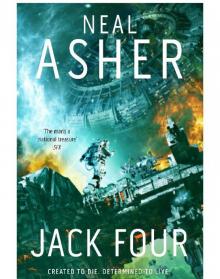 Jack Four
Jack Four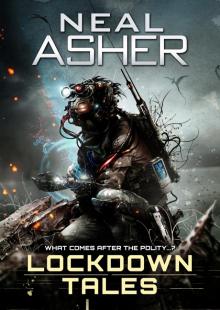 Lockdown Tales
Lockdown Tales The Warship
The Warship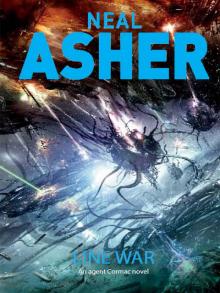 Line War
Line War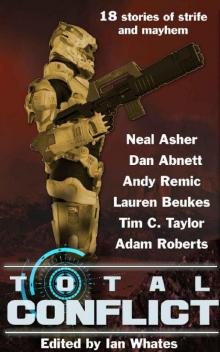 Total Conflict
Total Conflict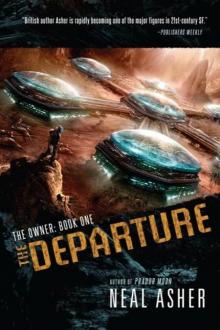 The Departure
The Departure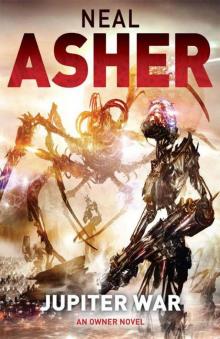 Owner 03 - Jupiter War
Owner 03 - Jupiter War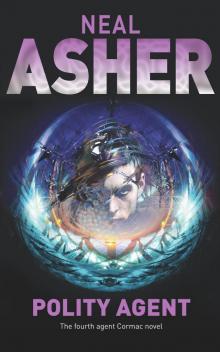 Polity Agent
Polity Agent Prador Moon
Prador Moon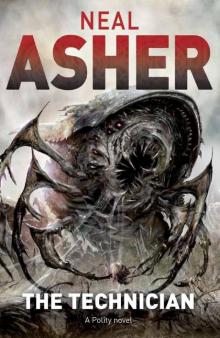 The Technician
The Technician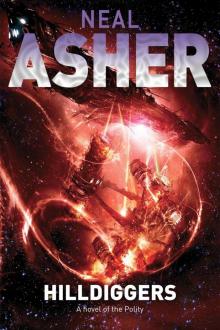 Hilldiggers
Hilldiggers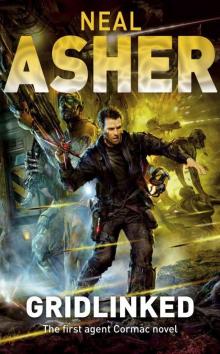 Gridlinked
Gridlinked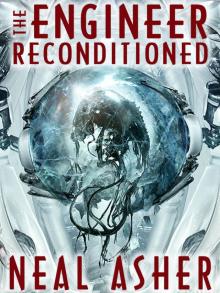 The Engineer ReConditioned
The Engineer ReConditioned Dark Intelligence
Dark Intelligence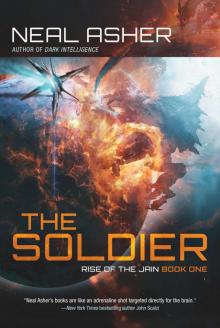 The Soldier: Rise of the Jain, Book One
The Soldier: Rise of the Jain, Book One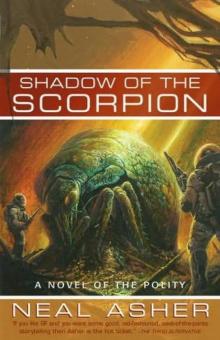 Shadow of the Scorpion p-2
Shadow of the Scorpion p-2 The Skinner
The Skinner The Soldier
The Soldier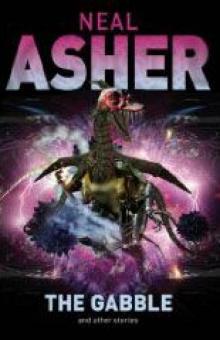 The Gabble p-13
The Gabble p-13 The Gabble and Other Stories
The Gabble and Other Stories The Parasite
The Parasite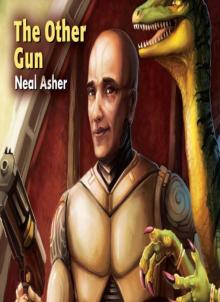 The Other Gun
The Other Gun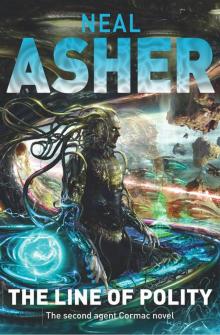 The Line of Polity
The Line of Polity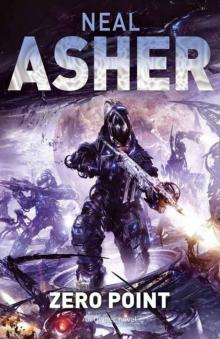 Zero Point (Owner Trilogy 2)
Zero Point (Owner Trilogy 2)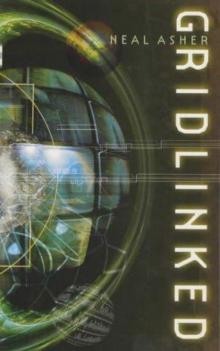 Gridlinked ac-1
Gridlinked ac-1 Prador Moon p-1
Prador Moon p-1 Infinity Engine
Infinity Engine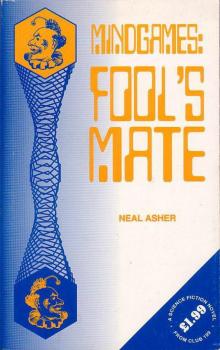 Mindgames: Fool's Mate
Mindgames: Fool's Mate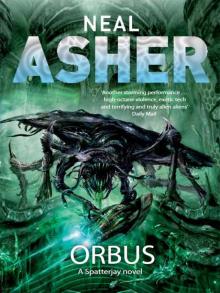 Orbus
Orbus Africa Zero
Africa Zero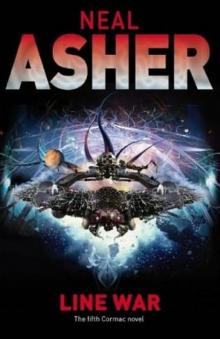 Line War ac-5
Line War ac-5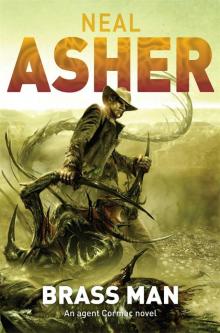 Brass Man
Brass Man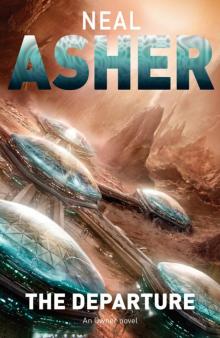 The Departure to-1
The Departure to-1 Cowl
Cowl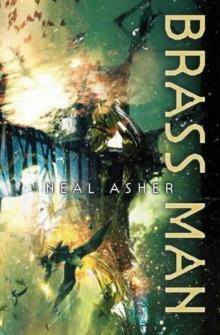 Brass Man ac-3
Brass Man ac-3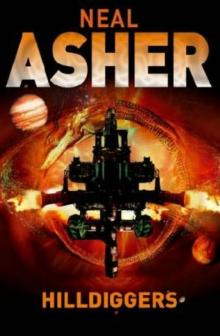 Hilldiggers (polity)
Hilldiggers (polity)![Greg Bear - [Eon Trilogy 1] - Eon (rescan) (v1.0) Read online](http://i1.bookreadfree.com/i2/04/08/greg_bear_-_eon_trilogy_1_-_eon_rescan_v1_0_preview.jpg) Greg Bear - [Eon Trilogy 1] - Eon (rescan) (v1.0)
Greg Bear - [Eon Trilogy 1] - Eon (rescan) (v1.0) The Skinner s-1
The Skinner s-1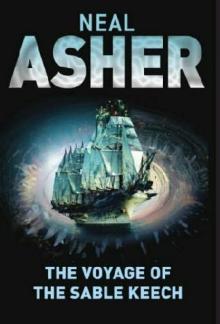 The Voyage of the Sable Keech s-2
The Voyage of the Sable Keech s-2 The Line of Polity ac-2
The Line of Polity ac-2 War Factory: Transformations Book Two
War Factory: Transformations Book Two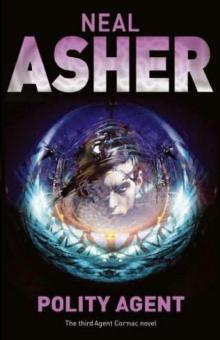 Polity Agent ac-4
Polity Agent ac-4